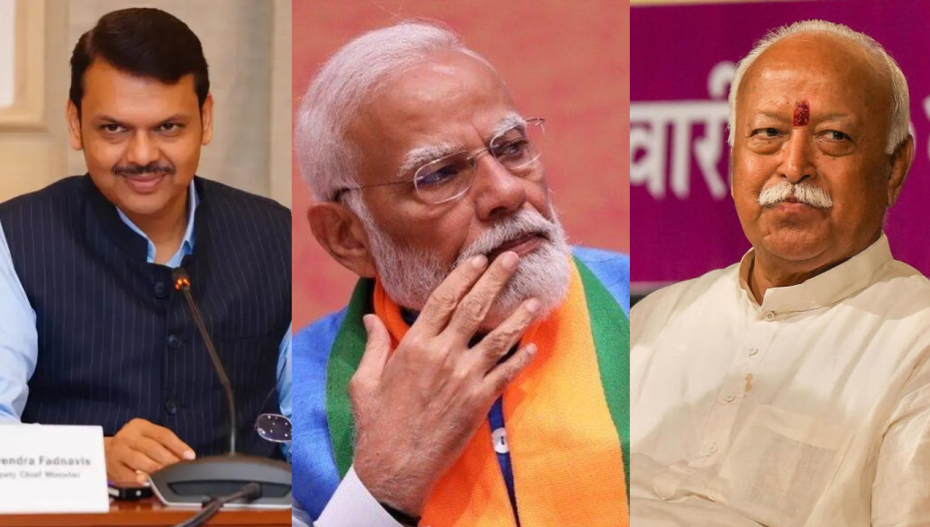Nagpur’s Mahal area, typically buzzing with noise, presents a contrasting tranquillity within the heavily guarded RSS headquarters on a sunny Friday morning. While the city outside is alive with election fervour, featuring colourful political posters and campaign vehicles blaring party messages, the Rashtriya Swayamsevak Sangh (RSS) presence remains understated. However, media reports suggest the organisation is playing a critical behind-the-scenes role in Maharashtra’s Assembly elections.
Across Nagpur and the state, swayamsevaks of the RSS have been quietly mobilised to support the ruling Mahayuti alliance, led by the Bharatiya Janata Party (BJP). Without visible campaign efforts like posters or rallies, RSS cadres are engaging in door-to-door outreach, urging voters to participate and support the BJP. This shift marks a deliberate and strategic move to address broader concerns within Hindu society.
“The RSS decision to play a proactive role in Maharashtra Assembly elections was part of meticulous planning, keeping in sight the larger aspects and concerns confronting Hindu society and its people. Unlike in the past, this time the campaign is rigorous, where individual swayamsevaks in smaller groups are reaching out to people across segments with an appeal not only to ensure 100% voting but also how and whom they vote,” an RSS functionary explained.
Addressing BJP-RSS Tensions
The increased coordination between the BJP and RSS follows a period of strain, highlighted during the Lok Sabha elections. The Sangh reportedly expressed dissatisfaction with BJP president JP Nadda’s remarks suggesting the party’s reduced dependence on the RSS. The BJP’s seat tally dropped significantly, from 303 to 240, with Maharashtra being a key state where the party underperformed.
In response, Deputy Chief Minister Devendra Fadnavis spearheaded efforts to mend ties, holding multiple meetings with RSS leaders to develop a strategy for the Assembly elections. BJP insiders revealed that RSS cadres were deployed in constituencies where the party faces challenges, with regular exchanges of feedback and corrective measures.
The Distinct Roles of RSS and BJP
Despite their ideological alignment, the RSS and BJP maintain distinct functions. “The RSS and the BJP are two different organisations with different roles,” said an RSS functionary. “Though our affiliation is for each other as we share a common ideology, we do not tell the BJP whom to give tickets in the elections and they cannot dictate terms to the RSS.”
Another RSS leader emphasised that their campaign focuses on Hindu unity rather than direct political endorsements. “Our swayamsevaks are not holding any public rallies or appealing to the masses to vote for certain candidates. The RSS in its characteristic style has activated its network to create awareness amongst people on crucial issues that are threatening the unity of Hindus. Our goal is to unite a strong Hindu Rashtra that will cater to the welfare of every individual, rising above caste, community and religion.”
Campaign Themes and Challenges
The BJP’s campaign reflects this emphasis on Hindu unity. Prime Minister Narendra Modi’s slogan, “Ek hai toh safe hai” (Together, we are safe), appeals to OBCs, Dalits and STs, countering the Congress’s alleged divisive tactics. Uttar Pradesh Chief Minister Yogi Adityanath echoed this sentiment, cautioning voters with, “Batenge toh katenge” (Divided we fall).
However, challenges persist. During the Lok Sabha elections, the Opposition’s “Save the Constitution” narrative attracted Dalit support for the Maha Vikas Aghadi (MVA). Additionally, Maratha quota demands led by Manoj Jarange Patil and the consolidation of Muslim votes behind the MVA further complicated the BJP’s prospects. The party has countered this with allegations of “vote jihad” and a narrative warning against societal divisions.
“In the Lok Sabha polls, we have all seen how dangerously the consolidation of caste and religion have taken place, which was detrimental for the society at large,” an RSS leader stated. “Our role is to impress upon the people the dangers of such consolidation that not only leave Hindus divided but also vulnerable.”
Countering Opposition Narratives
In a recent interview with a media publication, Fadnavis highlighted the Sangh’s pivotal role in countering the Opposition’s Bharat Jodo narrative.
“We appealed to organisations working under our ideological umbrella that if you don’t have to come into politics, don’t come, but nationalist forces will have to respond to anarchist forces and you will have to talk against anarchy,” he said. “They have helped us and because of their help, they have countered the Bharat Jodo narrative of the anarchist forces.”
As Maharashtra approaches its Assembly elections, the RSS’s quiet but significant presence reflects its focus on broader ideological objectives, aligning with the BJP’s political goals while maintaining its organisational independence.
Also Read: Ahmedabad: Five Murders in 10 Days Challenge Police Commissioner’s “Safety” Claims









